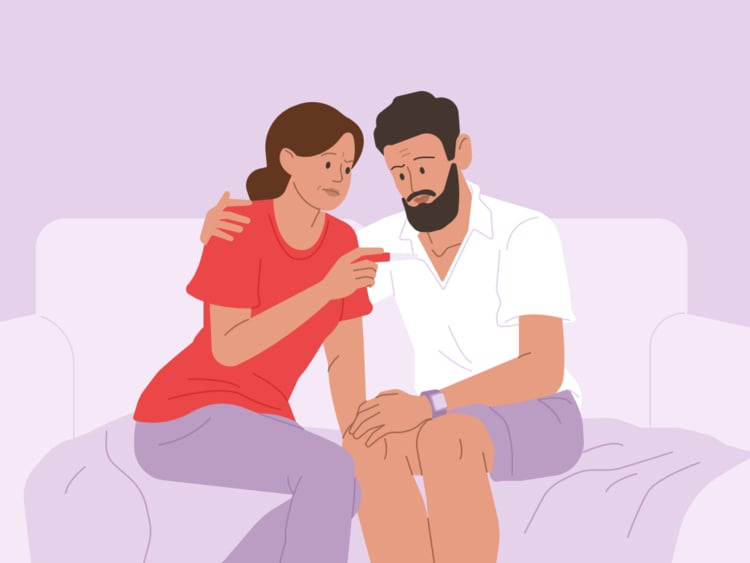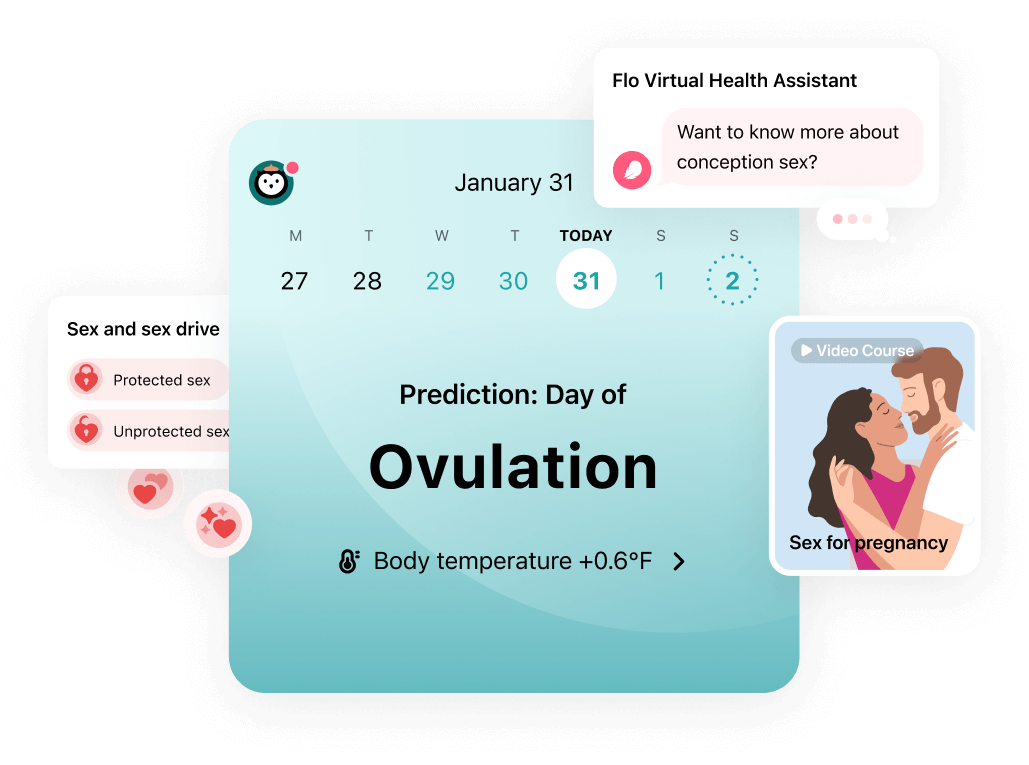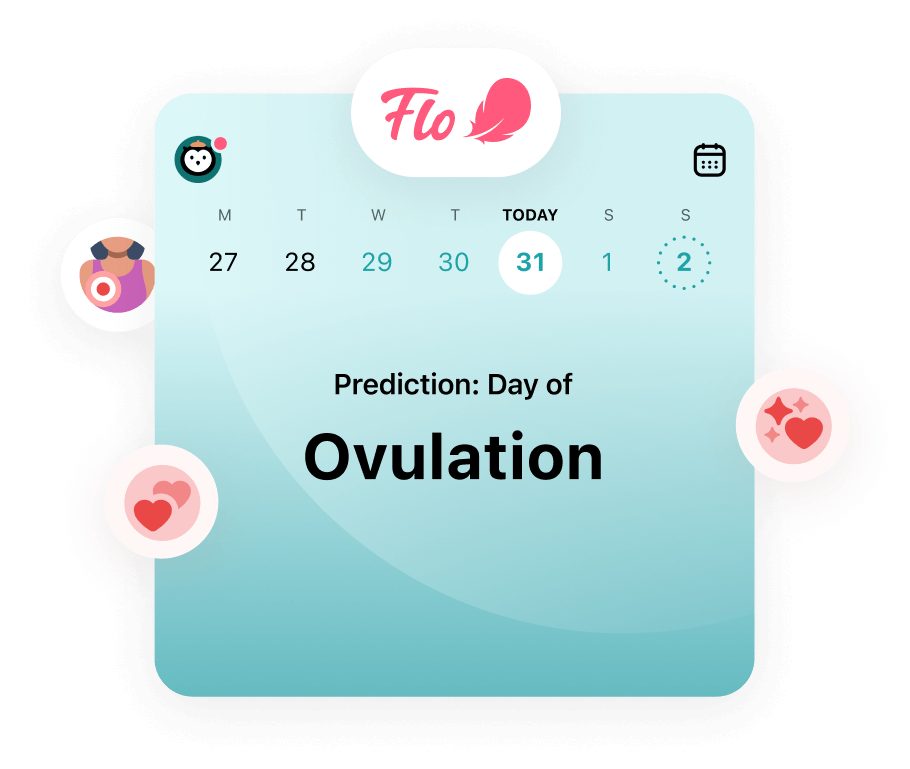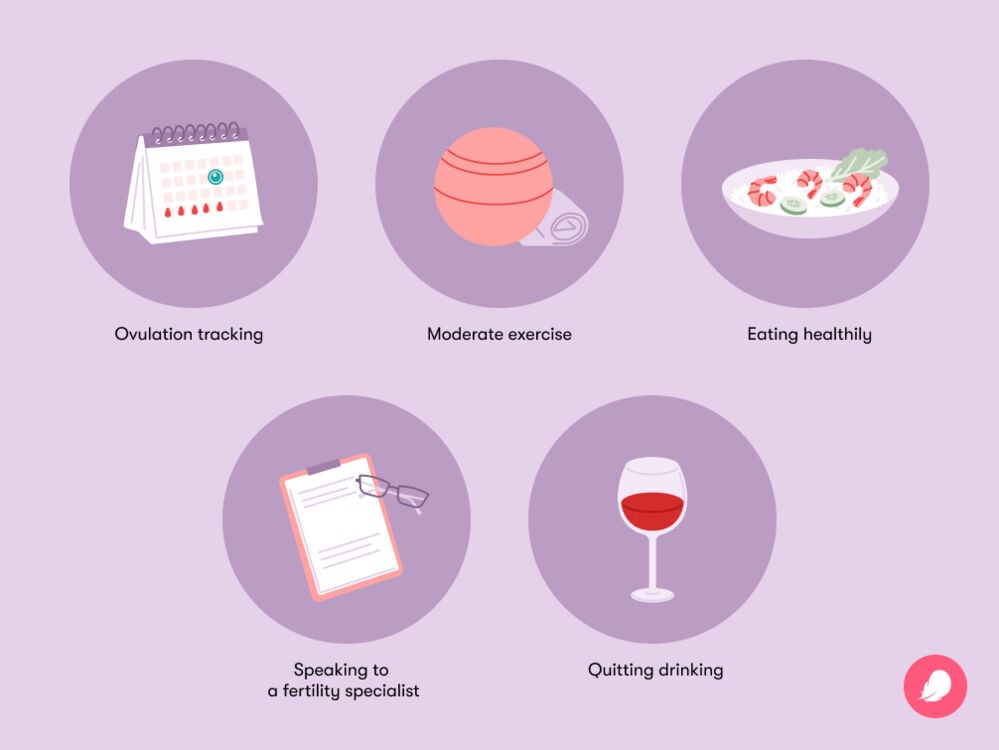It can be hard to know what to expect when you’re trying to get pregnant. Here’s the lowdown on what can impact your chances of conceiving and when to speak to a doctor.
-
Tracking cycle
-
Getting pregnant
-
Pregnancy
-
Help Center
-
Flo for Partners
-
Anonymous Mode
-
Flo app reviews
-
Flo Premium New
-
Secret Chats New
-
Symptom Checker New
-
Your cycle
-
Health 360°
-
Getting pregnant
-
Pregnancy
-
Being a mom
-
LGBTQ+
-
Quizzes
-
Ovulation calculator
-
hCG calculator
-
Pregnancy test calculator
-
Menstrual cycle calculator
-
Period calculator
-
Implantation calculator
-
Pregnancy weeks to months calculator
-
Pregnancy due date calculator
-
IVF and FET due date calculator
-
Due date calculator by ultrasound
-
Medical Affairs
-
Science & Research
-
Pass It On Project New
-
Privacy Portal
-
Press Center
-
Flo Accuracy
-
Careers
-
Contact Us
Why is it so hard to get pregnant? Everything you need to know


Every piece of content at Flo Health adheres to the highest editorial standards for language, style, and medical accuracy. To learn what we do to deliver the best health and lifestyle insights to you, check out our content review principles.
With patchy sex education in schools and unrealistic movie portrayals of how easy it is to get pregnant from a one-time fling, it’s unsurprising that some people aren’t prepared for the fact that it can take a while to conceive. But the reality is, many of us aren’t fertility experts, so it can be hard to know what to expect. So you might find yourself asking, why is it so hard to get pregnant?
There are lots of things that can play a role in how long it might take you to get pregnant, from whether you’ve been using hormonal birth control to your age and lifestyle factors. It’s normal to be eager for a positive pregnancy test and wonder why it hasn’t happened yet, so let’s dive into why getting pregnant can take time, with advice from a Flo expert.
Key takeaways
- Most healthy couples get pregnant after six months to a year of regular unprotected sex, but it may take you a little longer.
- Different factors can impact how quickly you might get pregnant, including how often you’ve been trying, when you’re having sex, your age, and the birth control you’ve used recently.
- It can be really emotionally wearing to try to get pregnant every cycle and not get the positive result you want. If you’re not pregnant after a year of trying, (six months if you’re over 35), or you’d like to conceive and are over the age of 40, speak to your health care provider.
Tracking your periods and ovulation using an app like Flo may help you understand when the best point in your cycle is to have conception sex. You can also connect with other people who are on a similar fertility journey through Flo’s Secret Chats.

 Over
7.8M
ratings averaging
4.8/5
*
Over
7.8M
ratings averaging
4.8/5
*
Understand your fertility better with the Flo app
- Learn more about your fertility signals.
- Make sense of conception sex with help from our virtual Health Assistant.
- Log when you have unprotected sex (for your eyes only!).
 Over
7.8M
ratings averaging
4.8/5
*
Over
7.8M
ratings averaging
4.8/5
*

Do you want to learn the best time to get pregnant?
The Flo app can teach you all about trying to conceive

 Over
7.8M
ratings averaging
4.8/5
*
Over
7.8M
ratings averaging
4.8/5
*
Understand your fertility better with the Flo app
- Learn more about your fertility signals.
- Make sense of conception sex with help from our virtual Health Assistant.
- Log when you have unprotected sex (for your eyes only!).
Is it hard to get pregnant?
You’d be forgiven for thinking that once you decide that you’re ready for a baby and start keeping an eye on when you might be ovulating during your cycle, suddenly you’ll become pregnant. That’s how it happens in the movies, right?
While many of us have been taught that getting pregnant is easy and that it’s preventing it that’s difficult, there’s a lot that has to align to conceive. In fact, there are only around six days each cycle when you’re most likely to get pregnant. This is known as your fertile window.
It might feel like we’re going back to basics here, but when you’re trying to get pregnant, it can be helpful to understand what happens during your menstrual cycle and how conception occurs.
Phases of your menstrual cycle
You may think of your cycle as being just your period, but it’s so much more than that. Your cycle can be split into two phases: your follicular phase and your luteal phase.
- Your follicular phase starts on the first day of a new period and ends when you ovulate. If your cycle is 28 days, then your follicular phase would be the first 14 days.
- Ovulation isn’t actually a phase of your cycle, but it’s a big event and crucial when you’re trying to have a baby. Ovulation is when one of your ovaries releases an egg to potentially be fertilized by a sperm.
- After ovulation, you enter your luteal phase. You’ll be in the second part of your cycle until the day before a new period starts. During this time, your body prepares you for either a potential pregnancy or your next period.
It can be tough to know which phase of your cycle you’re in and when you might be ovulating. You can use an app like Flo to understand your cycle length and what symptoms might be typical for you.
Ovulation and your fertile window
If you’re trying to get pregnant, then the aim is to have conception sex over the time that you’re ovulating so sperm can meet and fertilize your egg. Luckily, this doesn’t mean you have one chance on one day each cycle, as sperm can survive in your body for about five days. If sperm from up to five days ago are ready and waiting when you ovulate, pregnancy is possible.
Similarly, after you’ve ovulated, your egg remains viable for up to 24 hours, which means if you have unprotected sex within a day of releasing an egg, you could still get pregnant. This is why your fertile window is six days: five days before ovulation and the day after.
Implantation
You might think that once a sperm has fertilized your egg, the job of getting pregnant is done. However, this is only the beginning.
Once your egg has been fertilized, it may move down one of your fallopian tubes to your uterus. Once it reaches your uterus, it may implant into the lining and start to develop and grow. It isn’t until this point that you’re officially considered pregnant.
As you can see, getting pregnant involves quite a few steps. If you’ve been trying to conceive, and it’s taking longer than you expected, try not to be hard on yourself. It’s so tempting to compare our experiences to other people’s, but everyone is different, and no two pregnancies or fertility journeys are the same. Try not to worry, especially in the early months.
Is it hard to get pregnant?
Timing isn’t the only factor that might impact how quickly you get pregnant. Birth control, age, and how long you’ve been trying can all impact how hard you find it to get pregnant.
Recently been on birth control
If you’ve been taking some forms of hormonal birth control, it can take up to three cycles before your period and ovulation return to what they were. This might sound alarming, but try not to worry. Most forms will leave your system pretty quickly once you stop taking them. For example, if you’re taking the combined pill, which contains both the hormones estrogen and progesterone, your cycle may return to your normal right away after you stop taking it.
However, if you used the injection, it could take as long as 10 months before you start ovulating again. This is because the injection, intrauterine device, and implant are long-acting contraceptive methods. They stay in your body for longer, protecting you from unwanted pregnancies, but can take longer to leave your system.
If your cycle is irregular after you stop using hormonal birth control, try not to be too concerned. This is just your body adjusting to a change in your hormone levels. Your cycle should return to what’s typical for you within three months. If your cycle continues to be irregular beyond that, then you should speak to your doctor.
How long you’ve been trying
As we’ve already mentioned, most healthy couples become pregnant after six months to a year of regular unprotected sex. To break that down, you have between a 25% and 30% chance of getting pregnant each cycle if you’re healthy and in your 20s or 30s.
- 45% of couples under the age of 35 will conceive after three cycles of unprotected sex. This is around three months of trying.
- 65% of couples conceive after six cycles or six months.
- 85% of couples will conceive within the first year.
So, the stats are absolutely on your side.
Age
If you’re over the age of 35, you might wonder what that means for you and your fertility. Age and fertility is a hot topic, and there are a lot of medical myths and stigmas that are circulated. It’s believed that our peak reproductive years are our 20s and 30s. This dips slightly after 35 and then more significantly after 40. This means it could take slightly longer to get pregnant as you get older.
However, recent census data suggests that more people are waiting longer to try to have children and go on to have healthy, happy pregnancies. According to 2022 Census Bureau and National Center for Health Statistics data, fertility rates (how many children a person has) for US women aged 20 to 24 declined by 43% over a roughly 30-year period. Fertility rates for women aged 35 to 39 increased by 67%.
Underlying health conditions
Sometimes, the side effects of some health conditions can mean it’s harder to get pregnant. These include:
- Diabetes
- Chronic stress
- Polycystic ovary syndrome
- Underactive thyroid gland
- Primary ovarian insufficiency (when ovaries stop their normal function before the age of 40)
- Endometriosis
- Pelvic inflammatory disease, which can damage the fallopian tubes
If you’re trying to get pregnant with a male partner, it’s also important that you remember that this isn’t all on you. In fact, for one-third of couples who struggle to conceive, male infertility is a factor. Encourage your partner to speak to their doctor about their health. Their doctor may want to take a sample of their sperm to check its quality and mobility.
There can be a lot of shame and guilt attached to not being able to get pregnant, so if either you or your partner has a condition that could impact your chances of getting pregnant, try not to worry. You’re not alone in your fertility journey. Lean on your doctor for support. They’ll be able to talk to you about your options and the best next step.

Could it be infertility?
If you’ve been trying to get pregnant for a while, and it’s not happening, it’s totally normal for you to wonder if it has something to do with infertility. For so many people, infertility is a really scary word. However, between your loved ones and health care providers, there’s so much support out there. Similarly, assisted reproductive technology like in vitro fertilization and intrauterine insemination has developed a lot over the last few decades.
Speak to a fertility specialist
Trying to get pregnant can be really exciting, but if it’s taking a little longer than you expected, it can also be pretty lonely. If you’re concerned about getting pregnant, then reach out to your doctor. They will be able to talk to you about your fertility journey so far and may connect you with a fertility specialist.
It’s recommended that you see a fertility specialist if:
- You’re under the age of 35 and have been trying to conceive for one year
- You’re over the age of 35 and have been trying to conceive for six months
- You’re 40 or over and want to try for a baby
These appointments can feel daunting. If you’re the kind of person who finds comfort in being prepared, there are some things you can do. “Bring any initial workup that your OB-GYN or primary care doctor has done, whether that’s ultrasound results or blood work. It’s also important to be tracking your period and when you’ve been having sex for at least the past three to six months. So I would bring that [information] with you,” Dr. Charlsie Celestine, obstetrician and gynecologist, New Jersey, US, advises.
“The two people who are trying to have a baby together should go. Make sure you know or have a list of all the medications that you’re on, and you should know your past medical history, your family history, and past surgical history,” she adds.
Take a quiz
Find out what you can do with our Health Assistant
How to improve your chances of getting pregnant
Beyond having sex around the time of your fertile window, it might feel like there’s little you can do to maximize your chances of getting pregnant. However, as Dr. Celestine explains, that’s not the case. Here are her tips and tricks to try.
- Try ovulation tracking. You can either use an app like Flo or a calendar and pen to figure out when you might be ovulating each cycle. Learn more here.
- Make lifestyle changes. From quitting smoking to limiting the amount of alcohol you drink, Dr. Celestine explains that this all might help.
“I usually recommend general lifestyle changes — the same things to keep your body healthy and happy that you would do pretty much in general,” says. Dr. Celestine. “So that’s doing 30 minutes of moderate exercise a day. Eating well and having a balanced diet with not too many sugars and not too many carbs. Maintaining your weight — it’s best to be in the normal weight range (not too low, not too high) for your height.”
And remember, while trying to get pregnant can be a really personal journey, you’re not on it alone. Your doctor will be able to support you with expert care and guidance, and your loved ones are there to support you.
Frequently asked questions about how hard it is to get pregnant
What are the signs that you can’t get pregnant?
Dr. Celestine explains that your period is a “vital sign” if you’re trying to conceive. If your period is irregular, you don’t have one every month, or you notice a change in your cycle, then it’s a good idea to speak to your doctor.
How much sperm is needed to get pregnant?
“In reality, only one sperm needs to reach your egg in order for you to get pregnant. But sperm count overall needs to be normal to give the best chance of having at least one sperm in there that’s really good and strong to get to the egg,” Dr. Celestine says. If you’re curious what this actually means, normal sperm count ranges from 15 million to more than 200 million sperm per milliliter of semen. Pretty amazing, right?
How can you check if you’re fertile?
Dr. Celestine advises that the main indicators you can watch out for are having regular periods. It can also be a good idea to build your understanding of your cycle. You can do this by tracking when you ovulate using an app like Flo.


Hey, I'm Anique
I started using Flo app to track my period and ovulation because we wanted to have a baby.


The Flo app helped me learn about my body and spot ovulation signs during our conception journey.


I vividly
remember the day
that we switched
Flo into
Pregnancy Mode — it was
such a special
moment.
Real stories, real results
Learn how the Flo app became an amazing cheerleader for us on our conception journey.
References
“Female Fertility: Why Lifestyle Choices Count.” Mayo Clinic, 9 Jan. 2024, www.mayoclinic.org/healthy-lifestyle/getting-pregnant/in-depth/female-fertility/art-20045887.
“6 Things That Can Happen When You Stop Taking The Pill.” Cleveland Clinic, 7 Aug. 2019, health.clevelandclinic.org/6-things-that-can-happen-when-you-stop-taking-the-pill.
“Assisted Reproductive Technology (ART).” Eunice Kennedy Shriver National Institute of Child Health and Human Development, www.nichd.nih.gov/health/topics/infertility/conditioninfo/treatments/art. Accessed 8 Aug. 2024.
“Birth Control Pill FAQ: Benefits, Risks and Choices.” Mayo Clinic, 10 May 2023, www.mayoclinic.org/healthy-lifestyle/birth-control/in-depth/birth-control-pill/art-20045136.
“Combination Birth Control Pills.” Mayo Clinic, 13 Jan. 2023, www.mayoclinic.org/tests-procedures/combination-birth-control-pills/about/pac-20385282.
“Depo-Provera (Contraceptive Injection).” Mayo Clinic, 22 Feb. 2022, www.mayoclinic.org/tests-procedures/depo-provera/about/pac-20392204.
“Endometriosis.” Cleveland Clinic, my.clevelandclinic.org/health/diseases/10857-endometriosis. Accessed 8 Aug. 2024.
“Evaluating Infertility.” The American College of Obstetricians and Gynecologists, Jan. 2020, www.acog.org/womens-health/faqs/evaluating-infertility.
“Fertility Awareness-Based Methods for Family Planning: A Literature Review.” Journal of Christian Nursing: A Quarterly Publication of Nurses Christian Fellowship, vol. 37, no. 4, Oct. 2020, pp. 212–20, https://doi.org/10.1097/cnj.0000000000000758.
“Fertility Awareness-Based Methods of Family Planning.” The American College of Obstetricians and Gynecologists, Jan. 2019, www.acog.org/womens-health/faqs/fertility-awareness-based-methods-of-family-planning.
“How Common Is Infertility?” Eunice Kennedy Shriver National Institute of Child Health and Human Development, www.nichd.nih.gov/health/topics/infertility/conditioninfo/common. Accessed 8 Aug. 2024.
“How Long It Takes to Get Pregnant and How You Can Up Your Odds.” Cleveland Clinic, 27 Jan. 2023, health.clevelandclinic.org/how-long-does-it-take-to-get-pregnant.
“Follicular Phase.” Cleveland Clinic, my.clevelandclinic.org/health/body/23953-follicular-phase. Accessed 8 Aug. 2024.
“Having a Baby after Age 35: How Aging Affects Fertility and Pregnancy.” The American College of Obstetricians and Gynecologists, Feb. 2023, www.acog.org/womens-health/faqs/having-a-baby-after-age-35-how-aging-affects-fertility-and-pregnancy.
“Hypothyroidism and Infertility: Any Connection?” Mayo Clinic, 20 May 2023, www.mayoclinic.org/diseases-conditions/female-infertility/expert-answers/hypothyroidism-and-infertility/faq-20058311.
“Infertility.” NHS, www.nhs.uk/conditions/infertility/. Accessed 8 Aug. 2024.
Livshits, Anna, and Daniel S. Seidman. “Fertility Issues in Women with Diabetes.” Women’s Health, vol. 5, no. 6, Nov. 2009, pp. 701–07, https://doi.org/10.2217/WHE.09.47.
“Long-Acting Reversible Contraception (LARC): Intrauterine Device (IUD) and Implant.” The American College of Obstetricians and Gynecologists, Apr. 2024, www.acog.org/womens-health/faqs/long-acting-reversible-contraception-iud-and-implant.
“Low Sperm Count.” Mayo Clinic, 17 Dec. 2022, www.mayoclinic.org/diseases-conditions/low-sperm-count/diagnosis-treatment/drc-20374591.
“Luteal Phase.” Cleveland Clinic, my.clevelandclinic.org/health/articles/24417-luteal-phase. Accessed 8 Aug. 2024.
“Male Infertility.” Mayo Clinic, 28 Dec. 2022, www.mayoclinic.org/diseases-conditions/male-infertility/symptoms-causes/syc-20374773.
“Not Pregnant yet? When to Seek Help.” Cleveland Clinic, 11 June 2019, health.clevelandclinic.org/not-pregnant-yet-when-to-seek-help.
Practice Committee of the American Society for Reproductive Medicine and the Practice Committee of the Society for Reproductive Endocrinology and Infertility. “Optimizing Natural Fertility: A Committee Opinion (2022).” Fertility and Sterility, vol. 117, no. 1, Jan. 2022, pp. 53–63, https://doi.org/10.1016/j.fertnstert.2021.10.007.
“Ovulation.” Cleveland Clinic, my.clevelandclinic.org/health/articles/23439-ovulation. Accessed 8 Aug. 2024.
“Pelvic Inflammatory Disease.” Cleveland Clinic, my.clevelandclinic.org/health/diseases/9129-pelvic-inflammatory-disease-pid. Accessed 8 Aug. 2024.
“Polycystic Ovary Syndrome.” World Health Organization, 28 June 2023, www.who.int/news-room/fact-sheets/detail/polycystic-ovary-syndrome.
Schmidt, L., and A. N. Andersen. “Session 24: Ovulation and Fecundity.” Human Reproduction, vol. 25, suppl. 1, June 2010, pp. I37–38, https://doi.org/10.1093/humrep/de.25.s1.24.
Thiyagarajan, Dhanalakshmi K., et al. Physiology, Menstrual Cycle. StatPearls, StatPearls Publishing, 24 Oct. 2022, www.ncbi.nlm.nih.gov/books/NBK500020/.
Morse, Anne. “Stable Fertility Rates 1990-2019 Mask Distinct Variations by Age.” United States Census Bureau, 6 Apr. 2022, www.census.gov/library/stories/2022/04/fertility-rates-declined-for-younger-women-increased-for-older-women.html.
Yahya, Fadi. “Infertility and Stress.” Mayo Clinic, 24. Aug, 2022, www.mayoclinichealthsystem.org/hometown-health/speaking-of-health/infertility-and-stress. Accessed 8 Aug. 2024.
Yatsenko, Svetlana A., et al. “Primary Amenorrhea and Premature Ovarian Insufficiency.” Endocrinology and Metabolism Clinics, vol. 53, no. 2, June 2024, pp. 293–305, https://doi.org/10.1016/j.ecl.2024.01.009.
“Why Can’t I Get Pregnant?” Johns Hopkins Medicine, www.hopkinsmedicine.org/health/conditions-and-diseases/why-cant-i-get-pregnant. Accessed 8 Aug. 2024.
History of updates
Current version (12 September 2024)
Published (16 September 2024)
In this article

Get your personal guide to fertility
-
Learn how to read your body's ovulation signals
-
Find daily conception tips from our experts
-
Chat with others who are trying to get pregnant




